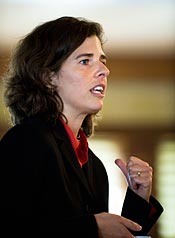Doughnuts, politics and a look into Wisconsin’s views and values
A knot of older men gather around a table in a Madison-area bakery each morning to laugh, crack wise, talk about politics over doughnuts and warm themselves with round after round of hot coffee.
They complain about “paper shufflers and money massagers” and rail about taxes, government and a failing economy. They’re well into a java refill when Katherine Cramer Walsh, a political science professor, shows up and seats herself.
She’s the only female at the table and is decades younger than the 70-something regulars, but Walsh has been here before and eases comfortably into the conversation, gently prodding the men to talk about their political beliefs and values.
An expert in how people form political opinions, Walsh has spent some of her time the last 18 months traveling the state and listening to Wisconsinites talking casually in their own terms, in their favorite spots and among people they usually meet.
The project was funded by a grant from the Ira and Ineva Reilly Baldwin Wisconsin Idea Endowment, which is intended to nourish relationships between UW–Madison and the state.
“It is clear that many Wisconsin citizens feel left out of the policy process. Even local public officials whom I listened to expressed skepticism toward the government and felt that the state’s urban areas have been increasingly out of touch with the needs of rural Wisconsin.”
Katherine Cramer Walsh
Since May 2007, Walsh spent time with 31 groups in 23 communities statewide — typically coffee klatches or informal groups that meet in the mornings at local restaurants, cafes, gas stations or churches. She visited each group up to four times, seeking out their opinions to get a sense of what issues concerned them most.
“Health care was one of the top three concerns for every group I spent time with,” says Walsh, who is the faculty director of the University of Wisconsin Badger Poll. “When we talked about the changes people would like to see in the health care system, almost every group expressed skepticism toward state and federal government.”
Walsh says that even those who supported a government organized, single-payer health care system expressed doubts about the government’s ability to deliver and maintain such a system.
Walsh used the responses to help craft questions in the latest UW Badger Poll on health care and the economy, released Oct. 31, 2008.
Expressions of skepticism of government varied across income groups, Walsh found during her travels.
“Among people on the lower end of the income scale, skepticism toward government was expressed as part of a worldview in which they were skeptical of a broad array of institutions of authority,” she says, noting their wariness also extended to health maintenance organizations (HMOs), corporations and the university.
“Among upper-income people, however, skepticism toward government was voiced in terms of particular people,” she adds. “They would criticize particular public officials and talk as if they could do better if they were holding public office.”
The people Walsh encountered on her visits tended to be male, middle-aged or retired and self-proclaimed Republicans. Nevertheless, she encountered a “stark feeling of distance” from state government across many types of people.
“It is clear that many Wisconsin citizens feel left out of the policy process,” she says. “Even local public officials whom I listened to expressed skepticism toward the government and felt that the state’s urban areas have been increasingly out of touch with the needs of rural Wisconsin.”
This geographic split was especially evident, with outstate residents feeling that Madison and Milwaukee do not understand how the rest of the state think, feel and live.
“A common perception across the state is that tax resources are ‘sucked in’ by Madison, diverted to Milwaukee, and then never seen again,” Walsh says. “Of course, in Milwaukee, people wonder where it is these resources are being diverted to.”
Those attitudes, often expressed over a cruller and washed down with coffee, Walsh says, “stand as a major challenge to support for government-centered health care reform.”
Subscribe to Wisconsin Ideas
Want more stories of the Wisconsin Idea in action? Sign-up for our monthly e-newsletter highlighting how Badgers are taking their education and research beyond the boundaries of the classroom to improve lives.





